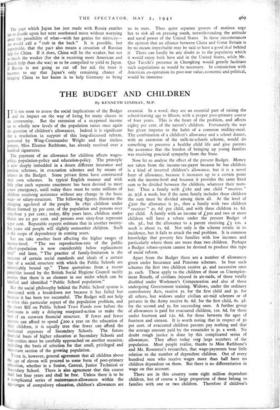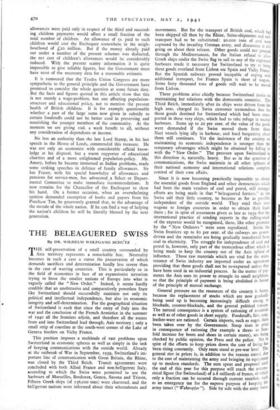THE BUDGET AND CHILDREN
By KENNETH LINDSAY, M.P.
IT is too soon to assess the social implications of the Budget and its impact on the way of living for many classes in the community. But the extension of a steepened income tax to wholly new levels of the population raises once again the question of children's allowances. Indeed it is significant that a resolution in support of this long-discussed reform, sponsored by Wing-Commander Wright and that tireless pioneer, Miss Eleanor Rathbone, has already received over a hundred signatures.
The payment of an allowance for children affects wages- policy, population-policy and education-policy. The principle is now deeply imbedded in a dozen different insurance and pension schemes, in evacuation schemes and by means of rebates in the Budget. Some private firms have constructed their own schemes. In typical English manner and with little plan each separate enactment has been devised to meet a new emergency, until today there must be some millions of children receiving assistance without any change in the basic wage- or salary-structure. The following figures illustrate the changing age-level of the people. In 1891 children under fifteen formed 35 per cent. of the population and persons over sixty-four 5 per cent.; today, fifty years later, children under fifteen are 22 per cent. and persons over sixty-four represent 9 per cent. Reputable experts estimate that in another twenty- five years old people will slightly outnumber children. Such is the scope of dependency in coming years.
Let me take another facet affecting the higher ranges of income-level. " The net reproduction-rate of the public school-population is now considerably below replacement level" and later, "The practice of family-limitation is the outcome of certain social standards and ideals of a certain type of a social, structure with which the Public Schools are inextricably bound up." These quotations from a recent pamphlet issued by the British Social Hygiene Council tacitly assume that there is an element in our midst which can be labelled and identified " Public School population."
But the social philosophy behind the Public School system is :hreatentd with a breakdown not because it has failed but because it has been too successful. The Budget will not help to solve this particular aspect of the population problem, and the short Bill on Public School Trust Funds now before the Commons is only a delaying rearguard-action to make the best of an outworn financial structure. If fewer and fewer parents can afford to spend Lzoo a year on the education of their children, it is equally true that fewer can afford the Incidental expenses of Secondary Schools. The future financial basis of higher education at Secondary Schools and Universities must be carefully approached on another occasion, including the basis of selection for that small, privileged and important section of the growing population.
There is, however, general agreement that all children above the age of eleven will proceed to some form of post-primary education, whether in a Senior, Central, Junior Technical or Secondary School. There is also agreement that this course shall last four years and shall be free. Unless there is to be a complicated series of maintenance-allowances within the age-ranges of compulsory education, children's allowances are essential. In a word, they are an essential part of raising the school-leaving age to fifteen, with a proper post-primary course of four years. This is the heart of the problem, and affects eighty per cent. of the nation's children. Fortunately the war has given impetus to the habit of a common midday-meal. The combination of a children's allowance and a school dinner, with an extension of the milk-in-schools scheme, would do something to preserve a healthy child life and give parents the assurance that the burden of bringing up young families was receiving practical sympathy from the State.
Now let us analyse the effect of the present Budget. Money not taken from the income-tax-payer because he has children is a kind of inverted children's allowance, but it is a novel form of allowance, because it increases up to a certain point with the income-level and because it provides the same fixed sum to be divided between the children, whatever their num- ber. Thus a family with £180 and one child " receives " 2s. 91d. a week, but if the same family includes three children the sum must be divided among them all. At the level of £200 the allowance is 5s., thus a family with two children " receives " 2S. 6d. per child, and with three children is. 8d. per child. A family with an income of L30o and two or more children will have a rebate under the present Budget of 16s. 3d., but the allowance to a parent receiving £3 ros. a week is about is. 6d. Not only is the scheme erratic in its incidence, but it fails to attack the real problem. It is common knowledge that poverty hits families with low incomes and particularly where there are more than two children. Perhaps a Budget rebate-system cannot be devised to produce this type of social reform.
Apart from the Budget there are a number of allowances given under Insurance and Pensions schemes. In four such schemes the first two children receive 4s. and successive ones 3s. each. These apply to the children of those on Unemploy- ment Benefit, of civilians injured in air-raids, of those totally disabled under Workmen's Compensation and also of those undergoing Government training. Widows, under the ordinary contributory Acts, receive 5s. for the first child and 3s. for all others, but widows under civilian air-raid schemes or of privates in the Army receive 8s. 6d. for the first child, 6s. 3d. for the second and 5s. for succeeding ones. A further group of allowances is paid for evacuated children, los. 6d. for those under fourteen and I25. 6d. for those between the ages of fourteen and sixteen. It is worth noting that in respect of 3o per cent. of evacuated children parents pay nothing and that the average amount paid by the remainder is 3s. a week. No doubt rough justice is done by this complicated series of allowances. They affect today very large numbers of the population. Most people realise, thanks to Miss Rathbone's and Mr. Rowntree's researches, that wage-payments bear little relation to the number of dependent children. Out of every hundred men who receive wages more than half have no children dependent on them. But there is no differentiation in wage on that account.
There are in this country some eight million dependent children, but of course a large proportion of these belong to families with one or two children. Therefore if children's allowances were paid only in respect of the third and succeed- ing children payments would affect a small fraction of the total number of children. An allowance of 5s. paid to such children would cost the Exchequer somewhere, in the neigh- bourhood of £20 million. But if the money already paid out under a number of the present schemes was deducted, the net cost of children's allowances would be considerably reduced. With the present scanty information it is quite impossible to give reliable figures, but the Government must have most of the necessary data for a reasonable estimate.
It is rumoured that the Trades Union Congress are more sympathetic to the general principle and the Government have promised to consider the whole question at some future date. But the facts and figures quoted in this article show that this is not merely a wage-problem, but one affecting population- structure and educational policy, not to mention the present health of British children. It is for example questionable whether a part of the large sums now given in subsidy to certain foodstuffs could not be better used in preserving and nourishing the younger members of the community. At the moment we are giving rod. a week benefit to all, without any consideration of dependents or income.
No less an authority than the late Lord Stamp, in his last speech in the House of Lords, commended this measure. He was not only an economist with considerable official know- ledge at his disposal, but a warm supporter of educational charities and of a more enlightened population-policy. Mr. Amery, before he became immersed in Indian problems, made some striking speeches in defence of family allowances. Sir Ian Fraser, with his special knowledge of allowances and pensions for service-men, has advocated , a Select or Depart- mental Committee to make immediate recommendations. It now remains for the Chancellor of the Exchequer to show his hand. On a former occasion, when an overwhelming opinion demanded exemption of books and papers from his Purchase Tax, he generously granted that, to the advantage of the morale of the whole nation. If he can find a way of helping the nation's children he will be literally blessed by the next generation.































 Previous page
Previous page